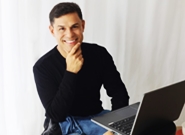 |
|
A book
inspired
by
clinical
cases
from
therapy |
|
|
|
|
|
|
Marcos Antônio Gonçalves de Alencar (photo) is a psychologist in the Brazilian city of Maceió and a member of the local Spiritist Movement. He has degrees in Media Studies, with a Master at the UFRJ university, and Psychology and Psychoanalysis.
He is a volunteer worker at Casa da Caridade Spiritist Centre in Maceió, where he has taken on the role of administration and financial manager. Last month, he published a book based on the clinical cases observed in his practice, as he explains in the following interview:
Where does your interest in psychology come from?
My dream as a teenager was to be a doctor. But I eventually realised that my true goal was to look after people. When I did my first university course, in Media and Social Communication, I had to study psychology. And that had an impact on me. Thirty years later, I decided to do a university degree in Psychology.
How about your passion for poetry?
I’ve always written poetry since I was a child. As a teenager, my poems were a means of expressing my uneasiness. As an adult, I only wrote from time to time, not very often. But when I began with my psychoanalysis practice, my poetry came back strongly. At the end of each session, we, psychologists, make notes about the latest developments of each patient. I began to notice that my notes had, more and more, a poetic note. I later revised them and I was surprised to find out that the poems came out from the technical notes. And that’s when I decided to consciously write poems based on psychology sessions.
Tell us a bit about your book.
The book is called A poesia como linguagem do Inconsciente: A transversalidade do percurso poético a partir da análise de casos clínicos [, which translates like Poetry as the Language of the Unconscious]. It was published on August 17th, 2023, at the Maceió Book Fair. Eighty percent of the first printing was sold on the first day and another printing was done for the events we had planned in São Paulo, Brasília and Recife. It is 220 pages-long and it contains eight clinical cases, mixing the theoretical background with the poems that I wrote based on the sessions with those patients. Readers will have access to the theory, the clinical cases and the poems, which also came from my unconscious. This is the first book of this nature to be published in Brazil.
How was the process of preparing those poems?
The poems are also an expression of my unconscious. They convey the pain and the anguish of the patients, as well as mine. After all, during a session of psychoanalysis there’s always an unconscious communicating with another unconscious.
Which aspect of those sessions had the biggest impact on you?
The cases were arranged according to the complexity demanded to handle them. So I picked the most serious cases, those that demanded more from me in this effort to welcome the patient, to understand their anguish and to find ways of helping them through what they said.
How can our readers buy the book?
They need to request it directly from me at @marcosalencar_psi. It’s not being sold in bookshops. It’s very difficult these days to make deals with the big Rio and São Paulo bookshops. Soon we will be publishing an online version of the book.
Based on these experiences, what lessons would you like to share with our readers?
That it’s possible to talk about pain. Obviously you can’t change what has already happened, but you can take a different look at what happened. You can find a different meaning to your pain.
And how do you see all that in the light of Spiritism?
As a Spiritist, it’s clear to me that I shouldn’t mix the science of psychology with the practice of psychoanalysis and the Spiritist Teachings. All the theory I have access to will help me understand the patient who’s going through a process of psychological illness, but I can’t use this knowledge to indoctrinate them or label them in a particular pathology. I’m fully aware of that. I must bear in mind that we are three dimensional beings: body, mind and spirit. We must look after our body by ingesting safe and healthy food, by exercising, drinking water and seeing a doctor whenever necessary. We must look after our minds by nurturing positive thoughts, doing good deeds, doing therapy and reading good books. And we must look after our spirit so that our mental and physical state doesn’t become a magnet for those spirits who are willing to suck our energy, our faith and our lives. |